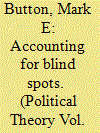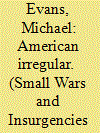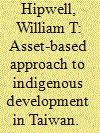| Srl | Item |
| 1 |
ID:
107947


|
|
|
|
|
| Publication |
2011.
|
| Summary/Abstract |
This essay is concerned with the challenges that moral "blind spots" create for the presence and endurance of democratic virtues under conditions of pluralism. A moral blind spot refers to the occlusions in individual moral perceptions and the limits that circumscribe moral sympathies owing to our ineluctable partialities as socially embedded beings. Blind spots constitute a tragic feature of human perception and moral judgment that facilitate and undermine human agency at once. Yet, far more problematic from the perspective of democratic epistemology and normative ethics is the denial or willful forgetfulness of their place in our individual and collective lives, and the concomitant failure to account for moral blind spots so as to check their most pernicious effects. Accounting for moral blind spots in practice requires actively planning for their presence through the cultivation of the "pathos of distance" towards ourselves and our collective political identities and social institutions.
|
|
|
|
|
|
|
|
|
|
|
|
|
|
|
|
| 2 |
ID:
107895


|
|
|
|
|
| Publication |
2011.
|
| Summary/Abstract |
This article examines the portrayal of frontier conflict in American writer, Cormac McCarthy's 1985 novel, Blood Meridian, or the Evening Redness in the West. It argues that McCarthy's work is one of the most profound American literary meditations ever composed on the subject of irregular conflict. The article traces the novel's literary antecedents and historical background and analyses its use of language, its structural narrative, and its lyrical descriptions of bloodshed and extreme guerrilla violence on the Texas-Mexican frontier in the mid nineteenth century. Particular attention is paid to McCarthy's development of a philosophy of war, which is related to the Counter-Enlightenment ideas of Joseph de Maistre and Friedrich Nietzsche. It is suggested that McCarthy employs the experience of irregular conflict on the American frontier as a philosophical lens to articulate the idea of war as a form of divination - an approach that is based on a mixture of Maistre's theory of redemptive violence and Nietzsche's cult of the existential warrior. The article concludes that McCarthy's blending of irregular conflict with a philosophy of war - empowered as it is by some of the most sumptuous of all twentieth-century American literary prose - endow this classic novel with a timeless and transcendental quality. McCarthy's unflinching representation of the anatomy of irregular conflict thus emerges not only as a searing portrayal of America's past frontier experience, but also as a powerful metaphor for understanding the endemic violence of twenty-first century insurgency in such countries as Iraq and Afghanistan.
|
|
|
|
|
|
|
|
|
|
|
|
|
|
|
|
| 3 |
ID:
092970


|
|
|
|
|
| Publication |
2009.
|
| Summary/Abstract |
Numerous scholars studying community efforts to (re-)establish autonomy have begun to focus on the importance of empowerment in the economic, political and cultural spheres. There is a growing understanding that such empowerment can be hastened by affirmative development strategies that build on community assets and capacities rather than attempting to redress - and thereby emphasising - needs or lack. Such development work reflects intertwined currents in contemporary philosophy, influenced by the thought of Friedrich Nietzsche and of Gilles Deleuze. In Taiwan, a recent resurgence in identities among marginalised aboriginal or indigenous peoples ('Formosans') has been accompanied by novel approaches to development. This discussion heuristically employs a set of development theories that are essentially variants of 'asset-based community development' (ABCD) to suggest that a focus on affirmation and empowerment has been and can be a key to success in Formosan development initiatives. The paper presents the results of qualitative field research, illuminating three case studies of Formosan development - in Tsou, Tayal and Taroko territories. It argues that Formosan development will benefit from a focus on community capacity, political empowerment and social as well as physical assets, and that to an important degree this has already happened in some communities.
|
|
|
|
|
|
|
|
|
|
|
|
|
|
|
|
| 4 |
ID:
124623


|
|
|
|
|
| Publication |
2013.
|
| Summary/Abstract |
Nietzsche's heralding of the 'Death of God' announces and exposes the condition of foundationlessness underpinning (Western) modernity and provokes the crucial question of the goals and purposes of political life. Without the figure of the divine as sanction and guide, political society lacks a stable foundation upon which to identify and legitimate itself. This paper explores the respective responses of two traditions of critical thought which engage explicitly with the challenges this poses, namely the messianic and the tragic. The central aim is to trace a series of 'traps' in evidence in both messianic and tragic thought which lead them to (re)turn to particular forms of transcendentalism; both traditions, it is argued, turn towards the divine in their responses to the 'Death of God'. However, the paper suggests that while the messianic is inextricably bound up in such a return to the divine, the tragic, as well as comprising several problematic violences, retains a particular salience in theorising subjectivity and the political under the condition of foundationlessness named by the 'Death of God'.
|
|
|
|
|
|
|
|
|
|
|
|
|
|
|
|